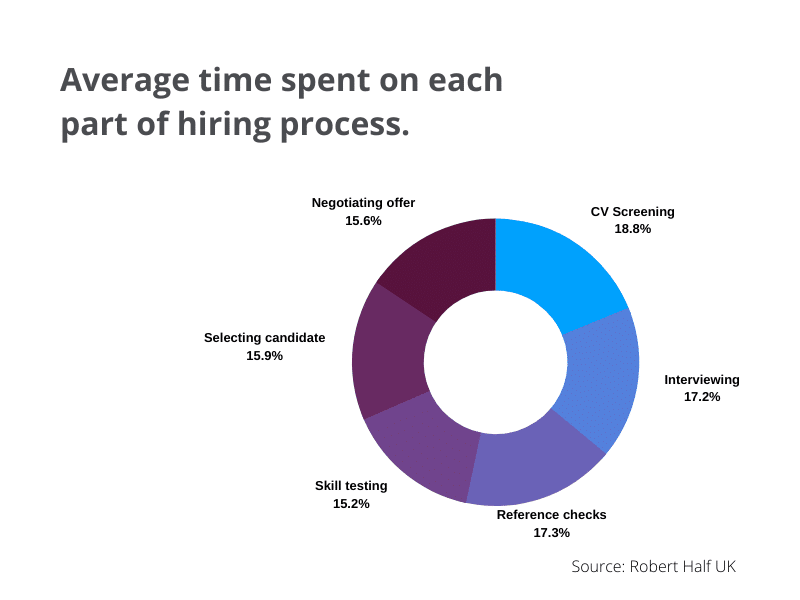Top 10 Role of AI To Fight Bias In Recruitment
Let’s pretend you have an assistant, Joe, who can quickly and accurately determine which individuals are the greatest fits for your open positions, arrange their interviews, and sort through the resumes without showing any prejudice. The uniqueness of this helper lies not in his extraordinary productivity but in the fact that he is not human. He’s AI. But unconscious bias isn’t something you can ever completely remove from the hiring process.
How Hiring Will Evolve With AI
While AI shows promise to reduce workplace discrimination, it’s important to keep in mind that it’s not a panacea. To verify the accuracy of the AI algorithms and make the ultimate hiring choice, humans are still required.
That is to say, AI should not be utilized to replace humans in decision-making roles, but rather to assist them. Even while AI is good at gauging soft skills like communication, cooperation, and problem-solving, a human touch is still necessary for hiring managers to ensure a good cultural fit.
Unconscious bias is a problem in recruiting because it occurs when human beings make decisions about people similar to themselves regarding their history, experiences, or other personal qualities.
Organizations must find a happy medium between the two for the best results when employing AI in recruiting while protecting the accessibility aims of doing so. The first stage of its implementation involves the use of AI for screening and evaluations, while the second stage involves the recruiting manager conducting interviews.
Read 10 AI In Manufacturing Trends To Look Out For In 2024
Deploying AI in recruiting helps to overcome unconscious prejudices which frequently function as obstacles to employment for certain groups of individuals. Algorithms built to be impartial and unbiased are fed massive amounts of data from job postings, applicant profiles, and other sources to learn the patterns and qualities most strongly correlated with a company making good hiring.
By analyzing this information, AI can eliminate biases in the recruiting process and choose the most competent individuals.
After the hiring manager has evaluated the candidates and reached a choice, they may utilize AI to examine their evaluations and detect any biases that may have impacted their decision-making.
How Can AI Transform Your Hiring Process?

The release of generative artificial intelligence (GAI) technologies like Open AI’s ChatGPT, Google Bard, and Microsoft’s new Bing has guaranteed one thing: widespread discussion of the potential effects of GAI on the workplace. It’s too soon to tell how GAI will affect different sectors, but it’s realistic to predict that many aspects of how individuals do their jobs will alter and develop.
This prompts several concerns among talent professionals. What impact will AI developments have on careers in talent acquisition? And how will the automation of some activities affect the skills recruiters need?
You can gain many benefits and opportunities if you integrate AI into the hiring process, including:
- Saving recruiters’ time from repetitive tasks to focus more on the best candidates
- Better quality of hire via standardized job matching
- Improved interaction, communication, and engagement throughout the recruitment lifecycle
- Removal of bias from the recruitment process
- Access to a larger talent pool to find suitable candidates for the job
But AI-powered recruitment is still evolving, and some of the challenges you need to look out for are:
- Higher upfront costs
- Need for a lot of data for training and engagement
- Potential to learn human bias from patterns in the existing recruitment process
- Potentially losing human touch in recruitment
- Scepticism and hesitation in adopting new technology
Read: Top 15 AI Trends In 5G Technology
Top 10 Role of AI To Fight Bias In Hiring
AI and ML may help businesses improve their hiring procedures by making them more systematic, objective, and fruitful. AI can expedite and automate interview scheduling, applicant screening, and measuring particular recruiting KPIs, freeing up human recruiters’ time to focus on higher-value activities like connection development with prospects.
- Identifies problematic language and gender coding in job descriptions, allowing companies to adopt more gender-neutral wording.
- Emphasizes competence rather than demographic information like race, age, or level of education.
- Allows for a wider range of applicants to be considered, some of whom may seem unconventional but are sure to contribute something new.
- Evaluate professional success above what is expected in a certain job to reveal a more complete picture of career potential.
- Enables businesses to focus on a candidate’s future rather than their past achievements.
- Test every candidate’s skills using the same criteria.
- This is AI hiring solutions’ major purpose. To achieve objective and equal recruiting, remove certain human variables and prejudice. Hiring managers may trust facts and smarts.
- Artificial intelligence can find and add top applicants to your talent pool. Intelligent solutions may construct a fake profile of your ideal prospect and search LinkedIn for matches.
- Any human will overlook many age, racial, gender, and background indicators in job applications and CVs. AI solutions use machine learning and powerful keyword trackers to drastically reduce disclosing candidate profiles.
- AI can truly level the playing field when evaluating applicants. talents evaluations can help companies assess work talents beyond a CV. This is also fairer for applicants who may be excluded owing to preconceptions.
Read OpenAI Open-Source ASR Model Launched- Whisper 3
[To share your insights with us, please write to sghosh@martechseries.com]

Comments are closed.